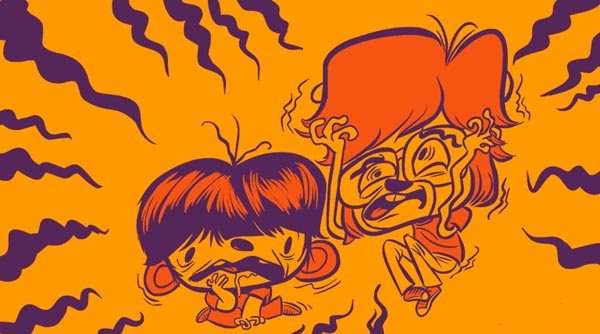

Gabe Swarr Turns “Life in the Analog Age” Into A Weekly Online Series
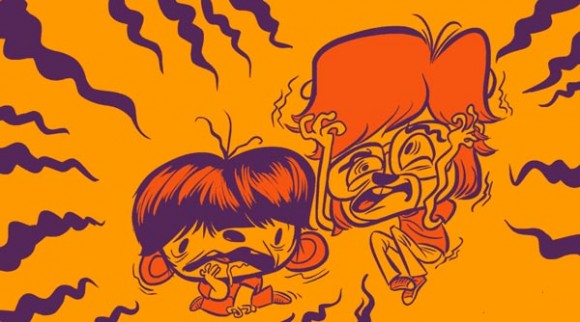
Animation veteran Gabe Swarr has been pumping out webcomics and short animated webisodes of his nostaglia-hued Life in the Analog Age for the past couple years alongside his studio day job. Earlier this week, he relaunched the property as a weekly animated series online, with the goal of new episodes every week. I chatted with Gabe via email about his decision to shift his online focus from comics to animated shorts, teaming up with Frederator’s new Allied Media label, the pros and cons of pitching, and the best advice for others who want to do their own online series.
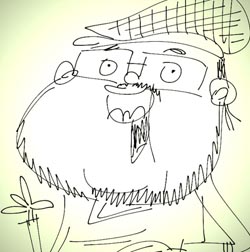 Cartoon Brew: You have a full-time job as the supervising producer and director of Nickelodeon’s Kung Fu Panda: Legends of Awesomeness. Where do you find the time to also write, animate and do the sound for a weekly series all by yourself?
Cartoon Brew: You have a full-time job as the supervising producer and director of Nickelodeon’s Kung Fu Panda: Legends of Awesomeness. Where do you find the time to also write, animate and do the sound for a weekly series all by yourself?
Gabe Swarr: Everyone asks me that! I wake up very early, every morning at 6AM. I exercise, get my morning chores done, and get to my desk for at least two hours of work before going into Nickelodeon. This is the best way I’ve found to make sure I have a sizable block of focussed uninterrupted time to get stuff done. Also working in the morning insures that I’m not exhausted from my day job.
Cartoon Brew: That still doesn’t explain where you get all your energy from. What does a typical Gabe Swarr ‘power breakfast’ consist of?
Gabe Swarr: Ha! Just some cereal and a banana, nothing exciting I’m afraid. I think it’s more the exercise than the breakfast! I actually starting running in the morning over a year ago. It has made a huge difference, and hopefully I’ll be alive a little longer to make even more stuff!
Cartoon Brew: What do you hope to accomplish by turning Life in the Analog Age from a comic and occasional animated webisodes into a regular animated webseries?
Gabe Swarr: I really want to get more people to see the series. I love sharing these stories and memories. There’s always such an amazing response from the comics, and I want to really focus on translating that to the shorts. I also think that the fact that it’s animated is a more unique way to experience the series. There are a lot of “slice of life” and autobiographical comics, but very few animated series like this one.
Cartoon Brew: In Analog Age, you try to express your honest emotions as they were at the time, whereas so much of today’s entertainment culture looks back at the past with snark and irony. How did you decide on your more affable approach to storytelling?
Gabe Swarr: Analog Age started as a complete departure from the things I do in my day job. I wanted to slow down the pace and express moments or feelings that you just don’t see in too many other places. The more I did it, the more I found the real tone of the series and learned more about the way I think our brains work.
I’m pretty sure our memories aren’t just a series of remembered facts of events. When you think back and remember how things were, yes you do recall what happened, but it’s not always accurate. That’s because, yeah, it was a long time ago, but it’s mainly because you’re using how you felt at the time as a frame of reference. Our memories are wrapped up in them. That’s nostalgia to me, true nostalgia, and that’s a lot harder to capture than just making fun of pop culture, fashion, or how poofy hair styles were.
That being said, when I do go back and look and unlock those emotions and feelings, I have to find a narrative or story in them. I have to remove myself and look at that moment from my current state of mind, and sometimes some of the best humor or scenes come from making fun of myself or the poor choices I made then, like this:
Cartoon Brew: Assuming that most of the stories are rooted in truth, have your siblings or parents had any reactions to the stories you’re telling, or expressed surprise at any events you’ve depicted?
Gabe Swarr: Yes, it’s all true. There are some stories that my Mom isn’t too fond of. She is the only family member who has spoken up about how they are being portrayed. When I’m making them, I’m never thinking about that. Some of the stories that didn’t put me in a good light were the ones that got the biggest reaction or started the most online conversations like “Hero”.
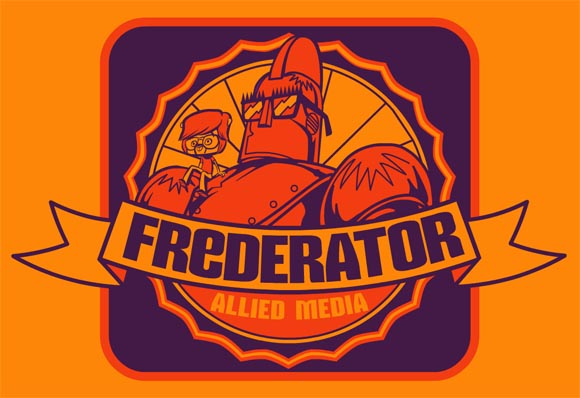
Cartoon Brew: Life in the Analog Age is becoming part of something called Frederator Allied Media which is a division of Fred Seibert’s company. How does that work?
Gabe Swarr: Well, I keep everything on my YouTube channel. I have complete creative control over schedule and content, but now I’m part of their ‘network.’ My cartoons can be seen by their 75,000+ subscribers as opposed to my 1000+ subscribers. We do an ad revenue split which motivates them to find sponsored ads.
Cartoon Brew: I think pitching ideas to networks and doing pilots is stupid in this day and age of the Internet. Am I wrong?
Gabe Swarr: I can’t say that you’re wrong or right, it depends really on what you want. If you want your show to be seen on worldwide TV, collaborate with working professionals, and not pay for the actual production, then yes, that’s a great way, and it’s been done for decades. There are some drawbacks though, first be prepared to sell full ownership of your idea, and the process is a very collaborative one. Your ideas might change a lot by the time it reaches the audience.
If you want full ownership, full creative control, and having a direct line to your audience, then online is the way to go. Be ready to pay and do the entire production yourself (or with generous friends), and work very hard to build your own audience basically from scratch.
So there are pluses and minuses to both approaches. Personally, I’m doing both traditional TV development, and indie online right now.
Cartoon Brew: The way I see it is this: a creator has the same shot of getting a pilot picked up for a network series as they do having a breakout web series. Except that the web creator ends up with much greater leverage,and therefore it’s more profitable for them. The “Annoying Orange” guy, who started out on the Web, is one of the few show creators who managed to launch a show on Cartoon Network without losing his ownership rights. Or take “Simon’s Cat”—360 million views on YouTube, 8 bestselling books, and now he’s beginning to license to other media platforms while still retaining ownership of his creation.
Gabe Swarr: Yeah, I think it’s great for those people, but like I said, they had to build that audience from the ground up themselves. That’s a job in itself and not an easy one. I spend a lot of my time responding to comments, posting, reposting, revising based on feedback on top of just making everything. Some people can’t or don’t want to deal with all of that. That might be one reason they go through a TV network, but the profitability is the trade off.
Cartoon Brew: Pretend I’m an animation executive. Gimme your elevator-pitch for Analog Age.
Gabe Swarr: Life in the Analog Age is an all-ages animated webseries all about growing up in a time before the digital age. It is a collection of vignettes that follow a “Little Bear Kid” in a time of his life where he is discovering himself and the world around him. All based on true events.
Cartoon Brew: Sold! Now give one piece of advice to someone who wants to start their own online animated webseries.
Gabe Swarr: The big overall thing is when creating anything, make sure it means something to you and that it says something. There are so many things out there that are just meaningless. It’s all like candy, fun to eat, but no nutritional value. You can’t live off of it. You want your creations to have some kind of purpose in the world, something that speaks to the people, and if it doesn’t, why make it in the first place?
Cartoon Brew: If you had to give up all your digital equipment (Cintiq, iPhone, new video game systems, etc.) tomorrow, do you think you could comfortably live again in the Analog Age?
Gabe Swarr: I totally would, but as long as I magically had no foresight into how things work now. I would go crazy missing the way we can use the Internet to learn, communicate, and distribute. I would also miss how much paper I’m saving by working digitally, but I would not miss the new video game systems at all! I still fire up my old N.E.S. to beat my favorite games.
For regular weekly episodes, visit LifeInTheAnalogAge.com.
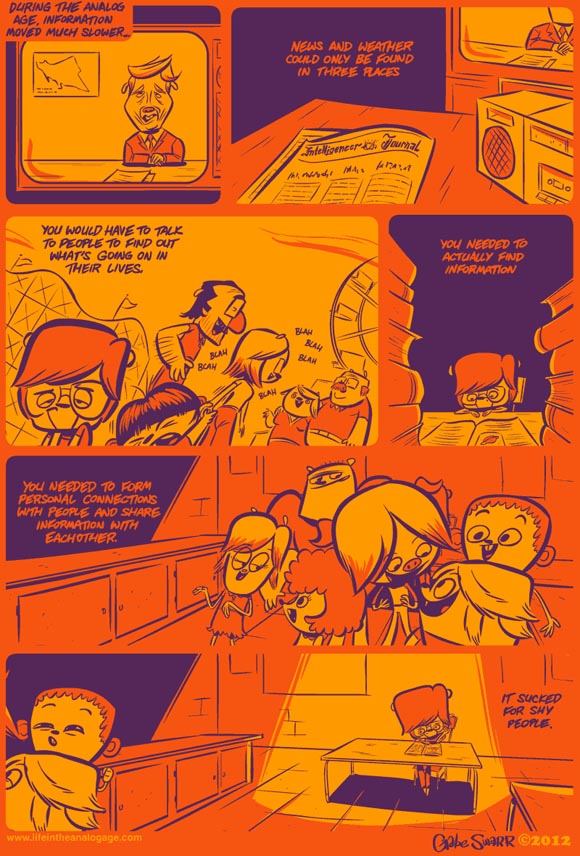

.png)